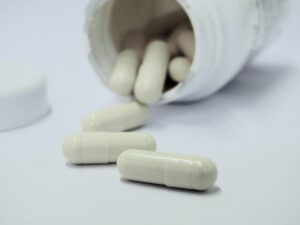Choosing the Right Probiotics
I am in favor of receiving probiotics and prebiotics via the foods we eat. Fiber is our gut bacteria’s food source and a diet high in fiber is needed to maintain optimal gut health. Vegetables, fruits, legumes, and seeds are great sources of dietary fiber. You should receive between 25-50 grams of fiber per day. Incorporating these foods in each meal will provide the needed requirement per day. A great plate of food will have half of the plate consisting of vegetables, ¼ in healthy fats (avocado/nuts), and ¼ in high quality protein.
However, despite incorporating a wide variety of these foods, I still suggest taking a daily probiotic supplement for optimal gut health. Depending on the status of your digestive tract, you may need a higher probiotic dosage. Starting off with 10 billion species is a great place to start if you have optimal gut health. However, if you’re experiencing digestive symptoms, I suggest upwards of 25 billion bacterial species per day. There are many probiotic supplements on the market so below are a few tips when selecting a good brand.
Tips for choosing the right probiotic:
VARIETY:
- There should be a good variety of well researched bacterial strands
- Certain bacterial strands are more beneficial for specific health conditions
- For instance, lactobacillus acidophilus aids in nutrient absorption while bifidobacterium breve fights against harmful bacteria.
DELIVERY METHOD:
- Acid and bile-resistant strains will ensure the probiotic will be able to survive stomach acid and reach the rest of the digestive tract.
CFUs:
- Generally speaking, the brand should have between 10-25 billion CFUs, depending on your particular health condition. For more serious health conditions, upwards of 25-100 billion and higher is recommended.
EXPIRATION:
- There should be a label displaying live microorganisms at the time of expiration.
REFRIGERATION
- Nowadays, there are many probiotics that do not need refrigeration, so you do not need to factor this in as a quality assurance measurement. Personally, I do prefer the ones that do require refrigeration.
The yogurt vs. probiotic debate
- I am not a fan of dairy products in general, as they can increase mucus production in the body and can trigger inflammation. Most yogurts in the market contain added sugars and flavorings. There are very few brands that contain live and active bacterial species. Even still, eating one cup of yogurt per day won’t equate to the amount of species contained in a probiotic supplement. The Dairy Council of California suggests you need about 3.5 cups of yogurt per day to maintain healthy gut flora.
Adding in a probiotic supplement will ensure your gut is in tip-top shape!
Be well,
Dr. Yas

